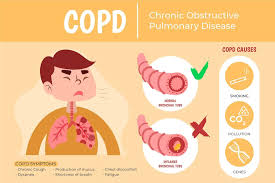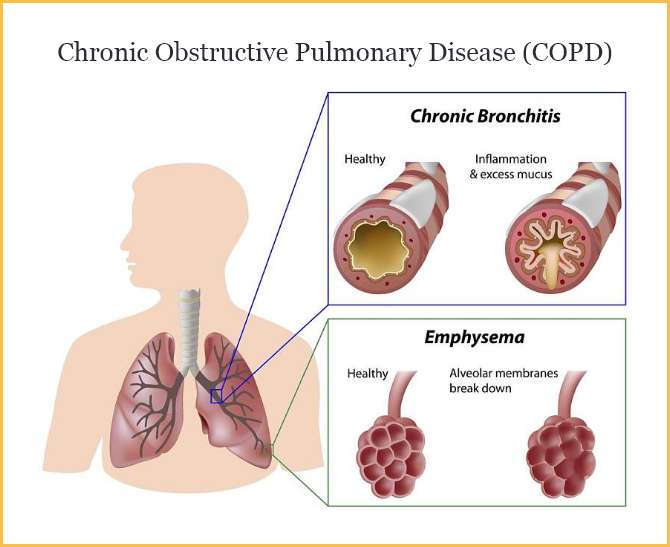Living with COPD
Lifestyle changes can help improve symptoms of COPD.
Quit smoking or vaping. This is the most important thing to do. Even if you have been smoking for many years, quitting can still help.
Avoid second-hand smoke or smoke from indoor cooking fires.
Stay physically active.
Protect yourself from lung infections:
- Get a flu vaccine every year.
- Get the pneumonia vaccine.
- Get all available COVID-19 vaccines and make sure you have had the latest boosters.

People living with COPD must be given information about their condition, treatment and self-care to help them to stay as active and healthy as possible.
WHO response
COPD is included in the WHO Global Action Plan for the Prevention and Control of Noncommunicable Diseases (NCDs) and the United Nations 2030 Agenda for Sustainable Development.
WHO is taking action to extend diagnosis of and treatment for COPD in a number of ways.
The WHO Package of Essential Noncommunicable Disease Interventions (PEN) was developed to help improve NCD management in primary health care in low-resource settings. PEN includes protocols for the assessment, diagnosis and management of chronic respiratory diseases (asthma and chronic obstructive pulmonary disease), and modules on healthy lifestyle counselling, including tobacco cessation and self-care.
Rehabilitation 2030 is a new strategic approach to prioritize and strengthen rehabilitation services in health systems. Pulmonary rehabilitation for COPD is included in the Package of Interventions for Rehabilitation, recently developed as part of this WHO initiative.

Reducing tobacco smoke exposure is important for both primary prevention of COPD and disease management. The Framework Convention on Tobacco Control is enabling progress in this area as are WHO initiatives such as MPOWER and mTobacco Cessation.
Further prevention activities include the WHO Clean Household Energy Solutions Toolkit (CHEST) to promote clean and safe interventions in the home and facilitate the design of policies that promote the adoption of clean household energy at local, programmatic and national levels.
The Global Alliance against Chronic Respiratory Diseases (GARD) contributes to WHO’s work to prevent and control chronic respiratory diseases. GARD is a voluntary alliance of national and international organizations and agencies from many countries committed to the vision of a world where all people breathe freely.
Leave a Reply